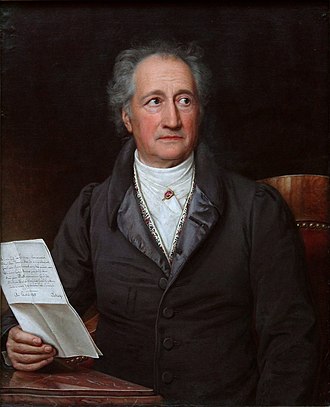Johann Wolfgang Von Goethe Facts For Kids
Johann Wolfgang von Goethe was a renowned German writer, statesman, and polymath, whose works significantly influenced Western literature, philosophy, and the arts.


Set reading age
View for Kids
Easy to read and understand
View for Students
Clear, detailed explanations
View for Scholars
Deep dives and big ideas
Introduction
Johann Wolfgang von Goethe was a famous German writer, poet, and thinker born on August 28, 1749, in Frankfurt, Germany. 🌍He is best known for his play "Faust," where a man makes a deal with the devil! 😈Goethe was not only a writer; he also studied science like botany (the study of plants) and color theory (how we see colors). 🎨He passed away on March 22, 1832, in Weimar, Germany, leaving behind a huge impact on literature and science. His works are still read today and teach us about life, nature, and our feelings. 📚
Gallery of Johann Wolfgang Von Goethe Facts For Kids
Goethe's Works
Some of Goethe's most famous works include:
- "Faust": A tragedy exploring ambition, love, and the human soul.
- "The Sorrows of Young Werther": A story about love and pain that made many cry!
- "Wilhelm Meister's Apprenticeship": A novel about self-discovery and personal growth.
- "The Magic Flute": An opera that combines music and storytelling beautifully. 🎶
His poetry captured feelings, nature, and even the beauty of everyday life. Goethe’s love for literature made him an important part of world culture! 🌍
Legacy And Impact
Goethe’s legacy is huge! 🎉He influenced many writers, artists, and scientists, not just in Germany but around the world. His works have been translated into many languages and are still studied in schools today. 🌎Goethe’s ideas about nature, emotions, and creativity inspire people to think deeply and express themselves. Many celebrate his birthday every year, and cities across Germany have monuments and festivals in his honor. 🎉He was more than a writer; he was a thinker who changed how we see the world, leaving a lasting impact on literature and human knowledge.
Scientific Pursuits
Goethe didn’t just stick to writing; he loved science too! 🌟He studied plants thoroughly, creating an accurate catalog of many species. His work on color was fascinating! He published a book called "Theory of Colors," where he shared his thoughts on how we see colors and how they affect our emotions. 🎨Goethe believed that colors have an influence on people, and he studied how colors change in nature with light. His scientific ideas were different from other scientists, but they encouraged people to think differently about nature and color. 🌈
Political Engagement
Goethe was interested in politics and social issues throughout his life. He received a position in Weimar's court as a minister and played an important role in shaping the city’s culture and arts. 🎭He believed that art and literature could change society for the better. Goethe often wrote about freedom, individuality, and the importance of creativity. His ideas inspired many people to think more critically about their own lives and governments. 📜Even though it was a long time ago, his thoughts are still relevant today, reminding us to appreciate the arts and stand up for our beliefs!
Literary Contributions
Goethe’s writings include plays, poems, and novels that explore human emotions and nature. One famous work is "The Sorrows of Young Werther," published in 1774, which tells the story of a young man's love and heartbreak. 💔Goethe also wrote "Faust," where Faust sells his soul to the devil for knowledge. Because of his creative storytelling, he became one of the most important figures in German literature! 📖His writing not only entertained but also inspired other writers in Germany and around the world. Goethe's work is still studied in schools today, making him a literary superstar! ⭐
Modern Interpretations
Today, Goethe’s works are seen in many forms! 🎬People create plays, movies, and even musicals based on his stories, like "Faust." Artists and writers often refer to his ideas when discussing emotions and nature. 😄Schools and universities have classes dedicated to studying his life and writings. You can find his influence in art, music, and literature everywhere! 🌟As we continue to explore his works, new generations understand the importance of creativity, nature, and human experience, just like Goethe wanted us to. Isn’t that exciting? 🎉
Early Life And Education
Goethe grew up in a wealthy family, which allowed him to get a good education. 📖He loved reading and writing from a young age! When he was just eight years old, he wrote his first poem! 📝He went to different schools, including a university in Leipzig, where he studied law but preferred writing. By exploring literature, philosophy, and art, he found his true passion. He was inspired by nature and began observing plants, animals, and colors. 🌼This love for learning shaped him into the brilliant thinker and writer he became.
Philosophical Influences
Goethe was deeply influenced by different philosophical ideas, especially the works of Immanuel Kant, a famous philosopher. 📚Kant believed that our experiences shape how we understand the world. Goethe agreed and thought that nature and human feelings were interconnected. 🌳He was also inspired by Romanticism, a movement that celebrated emotion and nature. This influenced his writing style, which often expressed deep feelings. Goethe tried to understand life’s mysteries and shared his thoughts in his works, encouraging readers to explore their own emotions and experiences. 💭
Johann Wolfgang Von Goethe Facts For Kids Quiz


Make things. Learn new skills. Share safely.
DIY is a creative community where kids draw, build, explore ideas, and share.
No credit card required